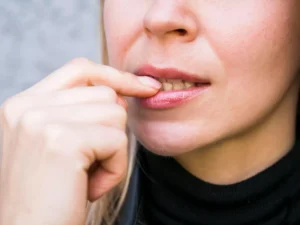What is angular cheilitis?
Angular cheilitis are small sores or cracks that appear in the corners of the lips. Although they may seem minor, they can be quite bothersome, especially when talking, eating, or even smiling. These lesions can be caused by infections, nutritional deficiencies, or repeated irritation in the area. They are also more common in people with weakened immune systems, diabetes, or those who wear poorly fitted dental prostheses.
Why does angular cheilitis appear?
Angular cheilitis does not occur by chance. There are specific factors behind its development that are important to understand in order to prevent it:
- Infections: The presence of fungi, such as Candida albicans, or bacteria in the area can trigger these lesions.
- Nutritional deficiencies: A diet low in B vitamins, iron, or zinc can weaken the skin and contribute to the development of angular cheilitis.
- Constant irritation: Habits like biting the lips, excessive salivation, or wearing dental prostheses that do not fit properly can repeatedly damage the skin.

Symptoms of angular cheilitis: How to know if you have It
You can easily recognize angular cheilitis if you pay attention to the following signs:
- Redness and inflammation at the corners of the lips.
- A burning sensation or pain when opening the mouth.
- Small cracks that may bleed or form scabs.
- Worsening of the lesions in cold or dry weather.
If you notice these symptoms, it is important to act quickly to prevent the problem from worsening.
Effective treatments for angular cheilitis
Professional treatments
When angular cheilitis persists or recurs, it is crucial to consult a specialist. Some professional treatment options include:
- Topical medications: Antifungal, antibiotic, or corticosteroid creams to reduce inflammation and combat infections.
- Adjustment of dental prostheses: If you wear prostheses, it is essential that a dentist checks and adjusts them to avoid further irritation.
👉 Need help? At Avilés Digital Dental Clinic in Fuengirola, our experts are ready to offer you personalized solutions. Schedule your appointment today!
Complementary home remedies
Although home remedies do not replace professional consultation, they can help relieve symptoms while you see your dentist:
- Aloe vera gel: Apply directly to the area to reduce inflammation and soothe pain.
- Natural honey: Its antibacterial and healing properties make it a perfect ally for soothing and rejuvenating the skin around the mouth.
- Coconut oil: Hydrates and protects the skin, helping to prevent new infections.
- Mind your diet: Avoid acidic, spicy, or salty foods until the lesion is completely healed.
Tips to prevent angular cheilitis
Prevention is key to stopping angular cheilitis from becoming a recurring issue. Follow these recommendations:
- Maintain good oral hygiene: Brush your teeth at least twice a day and don’t forget to clean your dental prosthesis if you use one.
- Keep your lips hydrated: Use natural lip balms to prevent dryness and cracking.
- Follow a balanced diet: Ensure you consume enough B vitamins, iron, and zinc—essential for healthy skin.
- Manage stress: Stress weakens the immune system, which may lead to skin issues. Managing stress can help support healthier skin and overall well-being.
When should I see a dentist?
If angular cheilitis does not improve after a few days, appears frequently, or is accompanied by other symptoms such as fever or widespread inflammation, it is crucial to consult a specialist. At Avilés Digital Dental Clinic, we have a team of dentists in Fuengirola ready to help restore your oral health.
👉 Don’t wait any longer: Book your appointment now and resolve your discomfort quickly and effectively.
FAQ about Angular Cheilitis: Causes and treatments
What is angular cheilitis?
It is a painful condition characterized by lesions that appear in the corners of the lips, caused by infections, nutritional deficiencies, or repeated irritation.
Which home remedies can i use?
Aloe vera, honey, and coconut oil are helpful options, but they should always be used as a complement to professional treatment, as they do not replace a dentist’s evaluation.
When should i see a dentist?
If angular cheilitis does not clear up after a few days, recurs frequently, or presents additional symptoms such as fever, it is essential to consult a specialist.
What oral hygiene habits can help prevent angular cheilitis?
Adopting a proper oral care routine is essential. Brush your teeth and gums gently at least twice a day, use alcohol-free mouthwashes, and avoid habits that irritate the mucosa, such as biting your lips or scrubbing aggressively.
What complications can arise if angular cheilitis is not treated properly?
If left untreated, angular cheilitis can lead to secondary infections, persistent pain, and, in recurrent cases, may affect overall oral health. It is important to follow the recommended treatment and seek professional help if the lesions persist or worsen.


